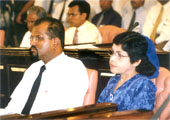|
Abraham Lincoln defined democracy as ‘government of the people by the people for the people’. The key word here is ‘people’. In Lincoln’s mind it probably meant only white Anglo-Saxon male landowners. Though at that time he was ostensibly fighting for the emancipation of black slaves, his agenda definitely did not include giving them voting rights. Nor did it include similar rights for women and the poor among men. Of course, our Maldivian forefathers those days had never heard of the term Democracy. About 140 years down the line where do we stand now? "
Today, in the Maldives all citizens, whether rich or poor, male or female, have equal voting rights. Our elections, both parliamentary and presidential, are overseen by reputed external observers, who repeatedly keep on telling the whole world that the process is free and fair, that there is no coercion, that there is no violence. This is no mean achievement for a third world country.
|
|

Members of the Citizen's Majlis deliberating on Budget 2002. Majlis elections are keenly contested and
voter turnout is high.
Where do Lincoln’s successors stand today? Does their meaning of ‘people’ really include all Americans? A few days back a reputed American journalist cynically revised Lincoln’s definition to read ‘government of the millionaires by the millionaires for the millionaires.’ There is a lot of truth in this statement. All American presidents from Kennedy to Bush have been millionaires. The recently elected mayor of New York is a billionaire. This couldn’t have been just a coincidence.
The truth is democracy is an ideal that a lot of countries strive for, but which no country has actually achieved. And in comparison to many other countries the Maldives is not doing
too bad. Unfortunately some of our friends don’t seem to be convinced that our elections are fair, despite overwhelming evidence. Perhaps, the only election they would consider fair is one where they win. But then, this is not always possible because in a parliamentary election there could be only two winners per constituency and in a presidential election there could be just one winner.
These few friends of ours seem to be characterised by extreme resistance to evidence. If only they would seriously consider the strides taken by Maldives since 1980, they would also see what the rest of us see. Almost everything that we see around us by way of development has happened after 1980. 99% of all graduates in the country have been trained since then. 99% of high-rise buildings have been constructed since then. 99% of islands have been electrified since then. 99% of inter-island telephone connections have been laid since then. The list would go on and on. But our friends would like to ignore all these. They also would like to ignore all the reports of international development agencies like the World Bank, IMF and UNDP. One would like to ask our friends what expertise they rely on when they disregard the opinions of these reputed organizations.
The so-called ‘economic crisis’ in the country exists more in some people’s imagination than in reality. All countries pass through economic downturns now and then. In 1997 ASEAN countries faced such a period. Starting 1998, Japan has been facing a recession and an actual contraction of the economy. This year America had been facing a slow-down even before September 11th. Even everybody’s role model, the idealistic island nation of Singapore, is facing a 2% contraction of its economy and record unemployment. So it is no big surprise that we also may face such a situation. But to call it a crisis and predicting all sorts doomsday scenarios is not being exactly patriotic, nor would it help anyone. In fact, it could become a self-fulfilling prophecy.
The fact is that, given our narrow resource base, what we have already achieved is remarkable. And given our extreme dependence on tourism and fisheries, which are subject to the vicissitudes of the global economy, it is even more remarkable how we manage to weather the current global storm so well.
No government could be perfect and not everything would be a success. But the remedy for this is not to discredit our country locally and internationally. In the current atmosphere of suspicion, unscrupulous reports could tarnish our image for ever. It could also harm our economy beyond repair. |




